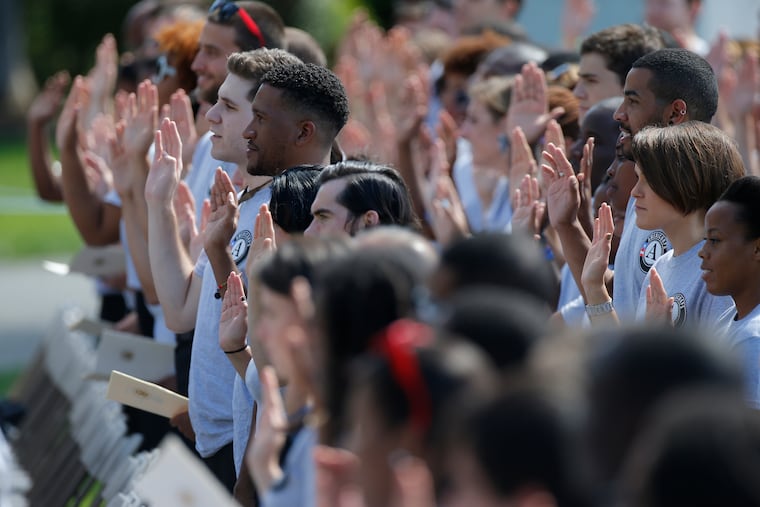A radical idea for bridging America’s divide | Will Bunch Newsletter
Could mandatory national service bring America together?

The subscription list for this newsletter is growing every week — you guys are awesome! Let’s not stop the momentum now. Tell your friends and family, and if someone forwarded you this email, why not sign up yourself. It’s so easy — inquirer.com/bunch.
Could mandatory national service unite young Americans while fixing the higher-ed mess?
World War II movies were a staple of late-night TV if you grew up during the Baby Boom, and there was one subplot in so many of them that it become a bit of a cliché: The combat unit that always included a farm boy from Kentucky or Tennessee and his uneasy-at-first relationship with the Jewish recruit who ate those weird rock-hard doughnuts (no, they’re bagels!) that his mom sent from Brooklyn. By movie’s end, this platoon of diverse Americans with nothing in common always came together to defeat fascism under heavy fire.
OK, sure, there was an element of patriotic hype masking a more complex reality. But the first 15 years after World War II – which forced millions of Americans from all 48 states to leave home and fight for a common cause – arguably were a less divisive time, politically. Also, the World War II fighting experience convinced Harry Truman to racially integrate the Armed Forces, a critical step that signaled the civil rights struggles and progress to come.
On the 75th anniversary of the end of World War II, America is angry, bitter, and split down the middle – even about fundamental stuff like science and the meaning of truth. The small-town folk hate the big-city cosmopolitans they call “liberal snowflakes,” and the educated urban elites hate Rust Belt “deplorables.” They don’t live in the same towns or the same neighborhoods. They’ve never even met each other.
I’ve been thinking a lot lately about how America became so divided, and that’s brought my head to a place I didn’t expect. What if all of America’s 18-year-olds – from Brooklyn to Kentucky to Hawaii – were required to invest one year to come together for a shared national purpose? Not to fight World War III – God, no – but to fight to rebuild our infrastructure, help struggling schools, or work outdoors in conservation. Some could serve in a peacetime military. All would take part in learning along the way.
I believe – coming out of this pandemic, whenever that is – the way forward for America starts with one year of mandatory national service for all 18-year-olds.
Of course, 18-year-old Will Bunch – trapped in 1977 with his Lynyrd Skynyrd LPs – is horrified by this suggestion. That’s because any kind of mandatory national service reeked too much of the just-ended military draft, the bugaboo of all young people coming out of the Vietnam era. Indeed, in 1980 I made the regrettable error of shunning Jimmy Carter to vote third party in part because Carter had reinstated draft registration early that year.
But times change. In 2020, the insane cost of college tuition and the lack of job opportunities for those without that overpriced credential of a diploma have wreaked havoc on modern American life. Just as societal changes convinced Americans in the 19th century that taxpayers should finance public education through age 18, we need to broaden our vision for the 21st century. The new government mantra should be “universality” for 18-24-year-olds – publicly-funded universities and community college, vocational schools, and other forms of job training and internships. This will break the duality of either a) one-size-fits-all college, or b) failure.
But let’s make it a grand bargain. The government gives you free higher ed, but you give back that one year of mandatory service. Structure the program to award college-level credit so it can swap out with freshmen year for the university-bound, while serving as a funnel into meaningful job training for those who weren’t – the young people we’ve been losing to drugs or suicide. And let’s bust the next generation out of the silos, both geographic and cultural, we’ve locked them into.
It’s a radical idea, but others are seeing it. “The American electorate is losing a common sense of what it means to be American,” Lilliana Mason, a University of Maryland professor of politics, recently wrote in Politico, adding: “We need to be reintroduced to each other in a place where we are all on the same team.”
I agree. Mandatory national service is both a way to fix higher education and to bring young Americans closer together. I plan to revisit this topic in the months ahead. I’d love to hear your thoughts, too.
» READ MORE: SIGN UP: The Will Bunch Newsletter